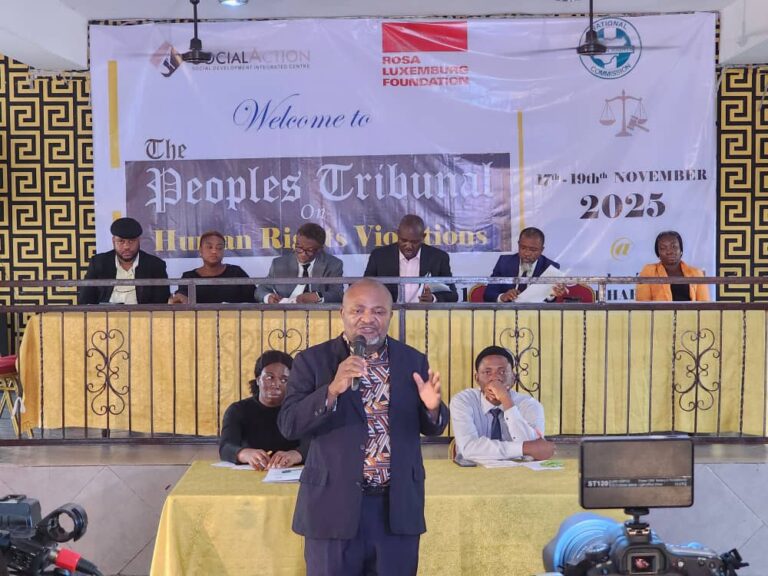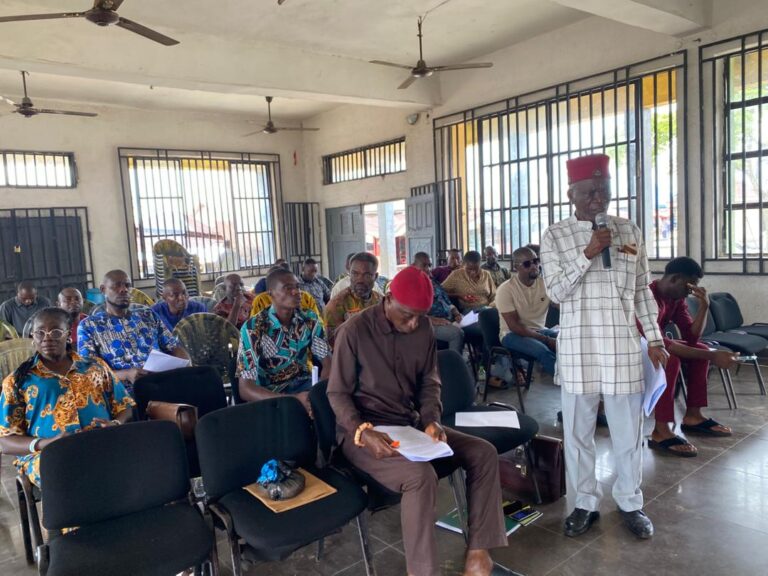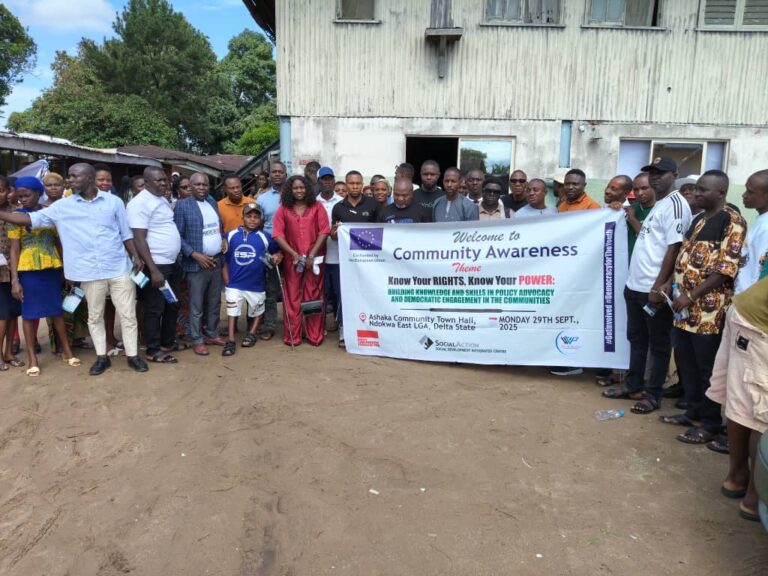Grassroots Justice: The Civil Rights Councils’ Quest for Human Rights Reform in Nigeria
In the pulsating heart of Nigeria, where the phrase “The Police is your friend” often triggers bitter cynicism rather than assurances of protection, the Civil Rights Council (CRC) has been actively striving to change this narrative.
The systemic injustices perpetrated by entities designed to protect, such as the police and other security services, still loom large. It is a sombre reality that these transgressions are not only rampant but undeniably urgent, necessitating swift and decisive action. Amid this daunting panorama, however, there exist glimmers of hope, one of which is the dedicated work of the Civil Rights Councils (CRCs). Created and supported by Social Action Nigeria, the CRCs represent a steady and hopeful journey towards improving human rights observance, bolstering the rule of law, and fostering a more constructive relationship between the citizens and security agencies.
The fight for justice in Port Harcourt
In the bustling city of Port Harcourt, the main centre of the Nigerian petroleum industry, the tragic case of Chima Ikwunado is still etched in the minds of many. Chima, a mechanic, was among four men arrested by the police in the Ikoku mechanic village in January 2020 and brutally tortured. Chima did not survive the torture. He died in police custody. As a newly married man expecting his first child, his untimely demise left a gaping hole in his family’s life.
Philip, the owner of the vehicle Chima was working on when arrested, still struggles with the painful memory. He recalls, “When I spotted my car parked outside the infamous Eagle Crack Division of the Police, I was naively relieved. I believed in the worn-out mantra – the Police is your friend. I couldn’t have been more wrong.” Amid an eruption of public outcry and despair, the CRC stepped up. The Port Harcourt CRC invited the victims, wrote petitions to the police and started a litigation process for justice for Chima and the other three victims of this horrifying case. The three others detained with Chiman were later released without charge or trial.
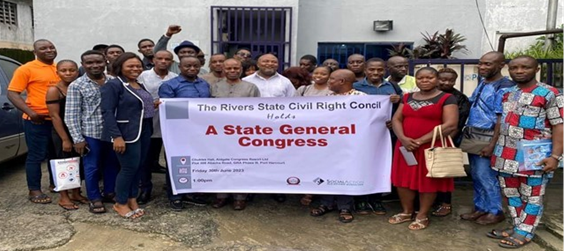
Congress meeting of Civil Rights Council, Port Harcourt and Bori Chapters
Pushing for change takes time and effort
Just weeks before the arrest of the Ikoku 4, the CRC petitioned the leadership of the Nigerian Police on November 4, 2019, calling attention to several cases of police torture and coercion, shedding light on the stark reality of human rights abuses in Nigeria. The petition stated that “officers of the law torture suspects to obtain a confession and go to the extent of inflicting cutlass wounds on persons to obtain admission to the crime for which the person was arrested or any other crime.”
The CRC’s petition was prompted by the case of Solomon Cletus, who was wrongfully arrested, tortured with a machete, starved of food and water, and denied access to family while in police custody. Mr. Cletus was released after the CRC intervened. Cletus remembers, “I felt the world collapsing around me. But CRC’s intervention gave me hope.”

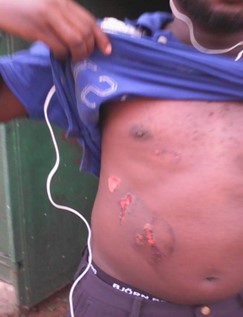
Solomon Cletus showing off the wounds from the machete used in torturing him
In August 2020, the mysterious case of Uche Brown Orukwu’s disappearance from police custody in Port Harcourt was brought to the forefront by CRC’s dedicated efforts. The CRC sent a petition to the Commissioner of Police, demanding immediate attention and investigation.
CRC’s relentless pursuit for truth also salvaged the life of Friday Tasie, a Port Harcourt goat seller who was wrongfully arrested for possessing a legally available medication. CRC’s intervention provided Friday a lifeline, reinstating his belief in justice.
Launched in Port Harcourt with a focus on the working class Diobu township, the CRC first expanded its justice campaign to Bori, in Ogoniland and Warri in Delta State. Today, the CRC has over 20 units across many states in Nigeria where its presence is felt. These states include: Rivers, Delta, Bornu, Enugu, Abuja, Akwa-Ibom, Calabar, Bayelsa.
Each unit of the CRC comprises members, mostly youth, who enrol because of a commitment to act at the grassroots level to defend fellow citizens’ human rights. Members address various human rights cases, from advocating for rape victims to promoting gender equality against patriarchal abuse and providing awareness about electoral rights. They have offered crucial solidarity and legal advice to prevent the forced eviction of thousands of poor people in Port Harcourt ‘Waterside’ homes.
Fostering Dialogue and Building Capacity through training
Part of the role of CRC members is to diligently volunteer time to document testimonies of human rights abuses. These revelations fueled the CRC’s efforts to repair strained relations between citizens and security personnel. Their proactive initiative involved advocacy visits to security agencies, presenting the stark realities of abuses, fostering mutual understanding, and discussing solutions.
The CRC has since launched a comprehensive training program targeting security personnel and citizens. They sought to bridge the knowledge gap in human rights protection and arm the public with a better understanding of their constitutional rights.

Courtesy Visit by Members of the Civil Rights Council to the office of the Economic &Financial Crime Commission

Taining/Visit of Civil Rights Council Members held at the premises of the Nigeria Security Civil Defence Corps
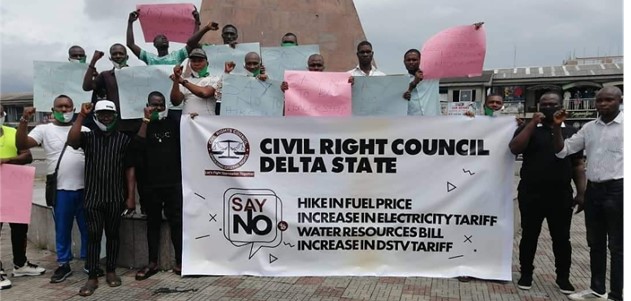
Delta State Civil Rights Council Protesting the hike in fuel price and electricity
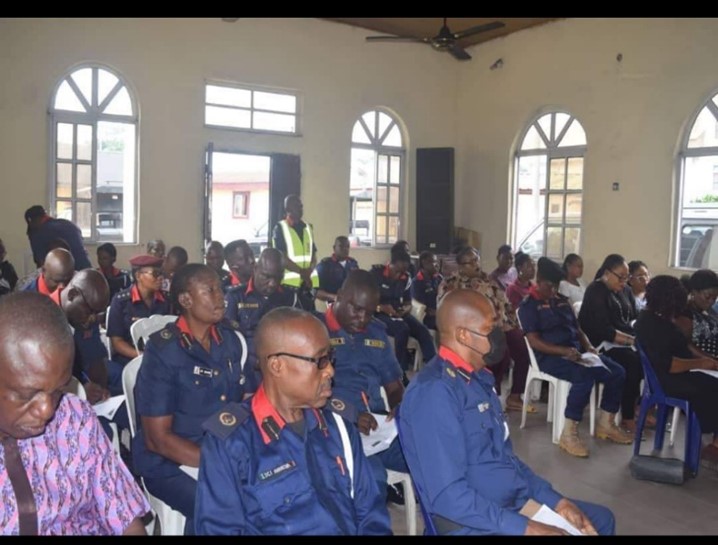
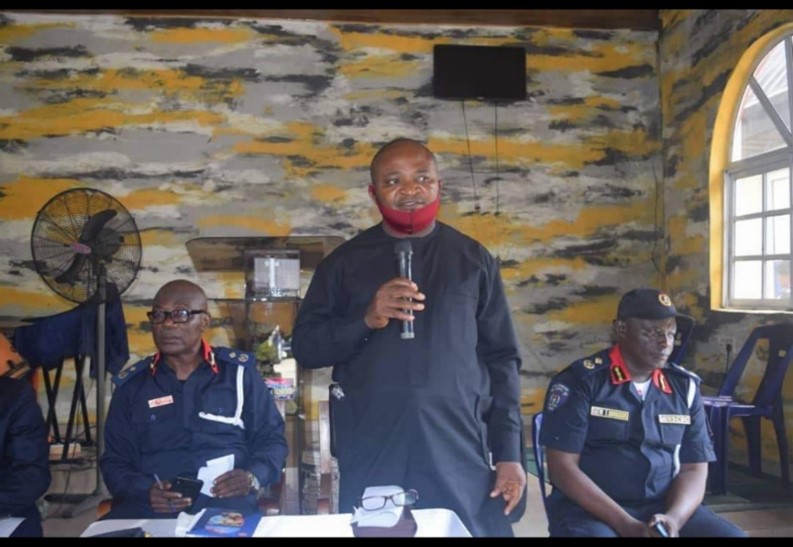
Training of security agents (NSCDC) By members of the Civil Rights Council
July 2019 saw the CRC’s Port Harcourt chapter collaborate with the Social Action Nigeria-supported Anti-Corruption Network, visiting the Economic and Financial Crimes Commission (EFFCC) Port Harcourt Zonal office. Nuhu Aliyu, a representative from the EFCC, voiced his support for the initiative, stating, “This platform allows us to build a relationship based on mutual respect and a shared commitment to combating corruption.” Units of the CRCs in the different states have visited senior officials of the Nigeria Police, the National Drug Law Enforcement Agency (NDLEA), Nigeria Security Civil Defence Corps (NSCDC), ICPC and the Nigerian Army.
The CRC have since organised human rights training workshops for officers from these institutions. The CRC organised an enlightening training session in Port Harcourt, held within the NSCDC premises. CRC’s legal partner, Barrister Victor Nweke, spearheaded the training with a critical focus on citizens’ fundamental human rights, particularly regarding suspects’ arrest, investigation, and detainment.
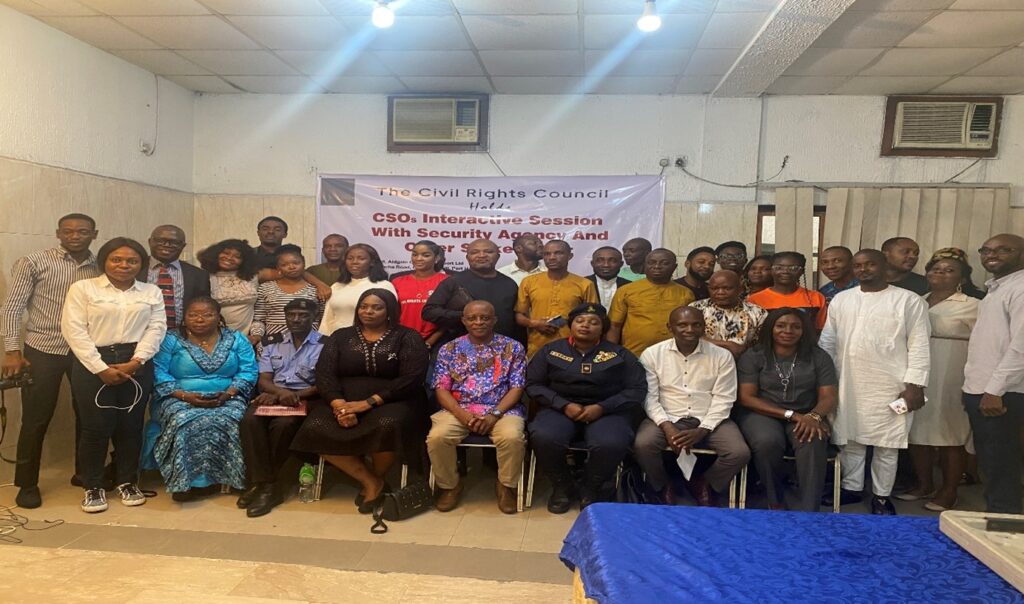
Training and Interactive session with Security agencies organised by CRC in Port Harcourt
During the meeting, Assistant Cadre Den Moses of the Nigeria Security & Civil Defence Corps voiced concerns, stating, “The protection of human rights and defence is something that security agents no longer enjoy.” He expressed dissatisfaction with some human rights activists, who he believed often “shield and defend civilians at all cost with the instrumentality of the law and approach the security agents with antagonism” due to their tarnished reputation.

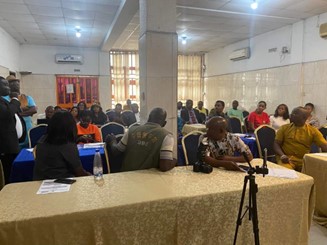
Despite this, Moses appreciated the newly formed platform to discuss these challenges, saying, “I’m glad that a platform has been created where these issues can be addressed.” He expressed anticipation for future collaborations, signifying the CRC’s success in fostering an environment for open dialogue and steps towards progress.
In Warri, April 2021 was a pivotal month as the local unit of the CRC hosted a public lecture titled, “The Role of the State in Arrest and Detention in the Administration of Criminal Justice Act 205”. This forum saw the active participation of members of the Nigerian Police, Army, and NSCDC.
Wider Impact
In the wake of the elections on June 15, 2023, the Civil Rights Council (CRC) demonstrated proactive leadership by organising an enlightening training and interactive session with the Bori Zone Area Command. The theme was “Police and Civil Society Interaction on Human Rights and The Rule of Law.” Lecturer Frank Nonubari emphatically highlighted that human rights are “natural, rational, inviolable, and unalterable”, emphasising that any deprivation amounts to a grave affront to justice.

Training and Interactive session with Security agencies in Bori
The CRC further broadened its efforts, hosting another interactive session in Port Harcourt. This session offered a pivotal platform for discussions on crucial security concerns between the Council and representatives from the NSCDC, EFCC, NDLEA, and the National Orientation Agency.

National Coordinator of the CRC, Arochukwu Ogbonna, observed, “Both the security and citizens are stakeholders in ensuring a safe and formidable society.” He criticised the prevailing chaotic, suspicious, antagonistic, and hostile interactions between citizens and security forces, attributing them to extrajudicial killings, harassment, and other injustices. He urged citizens to recognise their responsibilities, advocating for a paradigm shift towards viewing each other as partners in the Nigerian project.
Mrs. Esther Ozuronda of the NDLEA revealed a disturbing trend, “A lot of youths are into drugs,” and assured participants of the NDLEA’s dedication to collaboration and protecting their privacy. Through these meaningful discussions, the CRC established itself as a critical player in combating human rights abuses and advancing the rule of law in Nigeria.
A Journey of Transformation
The CRC’s transformative training sessions have fostered mutual understanding between citizens and security agencies and equipped activists with the knowledge to handle security confrontations better.
Gbenga Adeoye, a CRC member from Eleme in Rivers State, summarises this ongoing battle, “The challenges are still enormous, but so is our determination. We aim to ensure ‘the Police is your friend’ becomes a reality, not just a scoffed-at phrase.”
The CRCs’ story isn’t one of instant triumphs but a journey marked by dedication, determination, and relentless advocacy. They wage a ceaseless fight against human rights violations, harnessing education and training as their weapons.

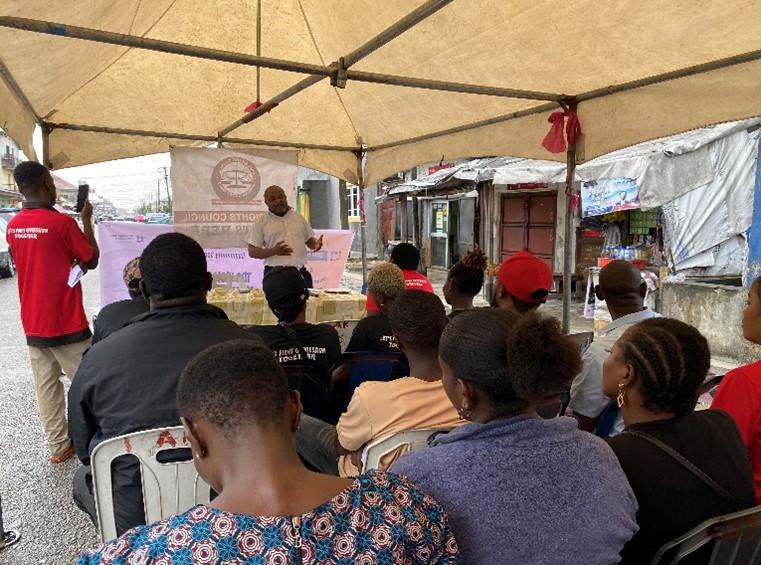
Training of community members on “the protection of the girl child against gender-based violence
CRCs aim to uplift the marginalised and voiceless, spreading awareness of human rights within society. Their initiatives target police and security services, intending to dismantle systemic biases and transform attitudes towards human rights, fostering empathy and respect for all individuals’ dignity.
But the journey is riddled with challenges—funding constraints, political pushback, and societal resistance. To overcome these obstacles, CRCs need our unwavering support, including financial aid, active participation, message propagation, and advocacy.
Remember, our collective strength can catalyse their work, driving the change we seek. The CRCs are altering the narrative around human rights abuses, but the road is long, and they need us. Stand with the CRCs—our support can propel their efforts and create a better world for all.


